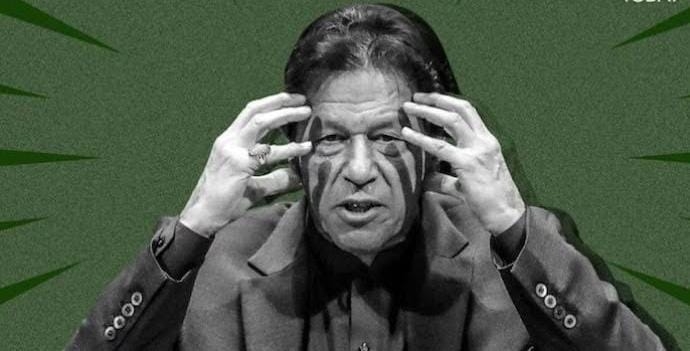Imran Khan: From another politician to the people’s messiah
Imran has also invoked the black chapters of Pakistan’s history be it the assassinations of its leaders or military rules in the county and has gone as far as to mainstream the atrocities committed by the Pakistan Army in Bangladesh. He has even equated himself to Sheikh Mujibur Rahaman, who like Imran had come to a confrontation with the military establishment of Pakistan and was denied his rightful position of the Prime Minister.

In the recent weeks, Imran Khan, the former Prime Minister of Pakistan has been on the headlines especially after the unprecedented riots and attacks by his supporters against the Pak. Government and the Pakistan Army, including in the General Headquarters. He was welcomed with the chants of Zinda Hai Inquilab (The uprising is alive) during his attendance before the Islamabad HC, which brings back the memories of the independence struggle against the English empire.
But this messiah like image of Imran may not have been his own personal creation, but can also be seen as the resultant of the action of his adversaries, especially after his decline from the chair of the prime Minister in shady and controversial circumstances.
Even though Imran’s party is facing a systematic purging with Amir Mir, the information minister having admitted that 3,428 have been arrested while the police has compiled a list of 25,000 people.
Attempts to send in the prominent PTI leaders in other parties is also visible, however it should be noted by Imran’s allies and party PTI has survived through Imran but not the vice versa.
Thus, it becomes imperative to look at the causes behind such image of Imran, who is poised to play significantly in the political arena of Pakistan.
As a Prime Minter, the foreign policy of Imran Khan was in essence an attempt to mirror the foreign policy of India (in principle), the policy of multi-alignment hedging.
Unlike under the previous regimes which were traditionally very close to the US and the West, under Imran Khan, Pakistan had become heavily dependent on China, possibly due to the loosing US interests in Afghanistan and possibly due to the policies of President Trump who had prioritized India over Pakistan in the region.
It is during this period that for the first time an increasing Russia-China and Pakistan collaboration was visible through the Russian participation in Pakistan’s Aman maritime exercise and through the use of a Russian RD-93 engines in the Pakistan-Chinese made JF-17 fighter jet.
Pakistan was also seen active in the SCO and in the middle east, with Imran’s eight visits to the holy city of Medina, and frequent visits to UAE etc. It had also witnessed the visit of the Russian Foreign minister in 2021, for the first time in years.
Such reality is further corroborated with the fact that after his decline as the Prime Minister, in his political rallies Imran Khan has often played the videos of the of Indian Foreign Minister, S. Jaishankar defending India’s imports of Russian oil, and Khan had even appreciated India’s policies to be ‘free’, to be for the Indian national interest, and for not letting the western block decide its fate.
In 2022, this attempted multilateral foreign policy of Imran was raised to a new limit when he had visited Russia, in a visit which was the first in 23 years by a Pakistani PM, but which had coincided with the beginning of the Russian operations of Ukraine on 24th February 2022, but interestingly rather than backing off from the visit, Imran had continued the visited and had met the Russian President Vladimir Putin, hours after beginning of the hostilities.
He had later taken the defense that he was unaware as to the invasion plans of Russia and can’t be blamed for the visit, but the notable fact is that even before the immediate day of the attack, Russian tanks and troops had been deployed in the frontiers indicating a great possibility of an engagement, and before the actual invasion, and US had warned of a ‘distinct possibility’ of Russia invading Ukraine and had advised the US citizens to leave Ukraine, This time was also characterized by visits by other western leaders like Emmanuel Macron and German Chancellor Scholaz to Russia in an attempt to bring a solution to the pre-attack tensions between Russia and Ukraine.
Josep Borrell, a high ranking EU office holder, has even admitted that in a phone call with the US Secretary of State, Antony Blinken, he was told about the ‘future invasion’ of Ukraine, before the actual events on the ground.
It is an unimaginable possibility that, Imran Khan was unaware about the ground situation in Russia and Ukraine and thus his visit had drawn mass criticism across the world and may have been viewed as anti-US and anti-west.
This anti-west image of Imran has turned into a major cash cow for Imran today. This image, was further strengthened when Imran, as Prime Minister had refused to condemn the Russian aggression in Ukraine and in a reply to the letter appeals of 22 western diplomats, in a rally he had said “ya ham koi gulaam hain, ki jo ap kahenge ham karelen”(are we your slaves that we must do what you say to us?), he had thrashed his political opponents by questioning them as to why were drone strikes, conducted by the west allowed inside Pakistan? Which may have been to paint them as US puppets.
The swift removal from power of an anti-west PM who was fighting against the allegedly US puppets has thus been perceived by the masses to be a ‘western conspiracy’.
Apart from this Imran since the commencement of his government in 2018, has been using religious appeal in his speeches. He is often seen carrying a rosary in his hands, which was also the case during many of his visits to the courts. In using the Islamic identity card, Imran has drawn inspirations from the Islamic scriptures. .Imran often compares his opponents with the antagonists as mentioned in the Islamic scriptures.
Even in his recent address to his countrymen he had compared General Bajwa(who he holds responsible for the alleged regime change) as ‘Phiron’, a despotic ruler of Egypt who had opposed Prophet Moses. Another Islamic antoagonist, Yazid (a ruler who had opposed Husayn, the son of Calpih Ali has also been used to refer to the current Government by PTI workers.
His wife Bushra Bibi, is a naqabi women and has been known to be a ‘spiritual healer’. Imran had also repeatedly visited Mecca and Medina, the holiest sites of Islam during his tenure as the Prime Minister, all of which has further strengthened his public image.
The loss of PMship by Imran is also very crucial to understand the current stature of Imran. When the no confidence motion was proposed against his government , it was dismissed by the then deputy speaker, citing external interference.
During these proceedings Imran had publicly announced that attempts have been made to remove him from power and had kept reiterating them, till date, by blaming the retired Military Officials like General Bajwa. He calls the current government as an ‘imported government’(meaning western imposed).
To understand the larger picture, before the elections in the month of July 2018, the former Prime Minister Nawaz Sharif (a political opponent of Imran) was found guilty in various cases including the Avenfield corruption case for which he was awarded a 10-year term which was later suspended, but he later was convicted for 7 years in another case after which he was shifted to UK citing medical reasons.
Imran’s independent foreign policy and uproar against the alleged US interference and the fact that his prime opponent of the time was sentenced for corruption, and had shifted to UK(though for medical reason) seems to have resulted in creation of this larger-than-life image of Imran, where he is looked upon as a national hero who has stood against the US dictates which maybe seen as the cause of his removal from the office.
Imran has also used this opportunity to shift the blame of Pakistan’s failed economy etc. on the current regime. Due to such factors, it was observed through the Gallup Public Pulse Report that Imran Khan was viewed favorably by 61% of the people while Bilawal Bhutto and Shehbaz Sharif have only 38% favorable views. While 62% blame the PDM for inflation and economic instability instead of Imran’s PTI.
Even with 121 cases against him and the famous ones being the Toshakhana case and the Al-Qadir trust case which may have had an angle of defaming Imran, have actually benefited him further.
During the procedures of arrest, the ways which the security forces of Pakistan have opted, such as the use of paramilitary forces or to forcefully enter a court building by breaking its windows, are undefensible for any state which claims to follow the principles of Rule of law and Procedure established by law.
Imran has also invoked the black chapters of Pakistan’s history be it the assassinations of its leaders or military rules in the county and has gone as far as to mainstream the atrocities committed by the Pakistan Army in Bangladesh. He has even equated himself to Sheikh Mujibur Rahaman, who like Imran had come to a confrontation with the military establishment of Pakistan and was denied his rightful position of the Prime Minister.
In such circumstances, the allegations of some cases like Tosakhana hardly hold any relevance in the eyes of Imran’s supporters as circumstances guide the public opinion to the narrative that Mr. Imran’s party the PTI which had the highest members in the parliament after the 2018 elections, was unjustly removed from power.
The circumstances where Imran was openly defending his dealings with Russia and calling it as national interest, and the anti-US, anti-Bajwa allegations from his own mouth, added with a alleged assassination attempt and the harsh methods employed to arrest him, along with the extraordinary legal reliefs provided to Imran from the Pak.
Supreme Court and High Court, these circumstances are more than enough to create an image that an ‘Islamic’ Imran is the sole defender of Pakistan’s independence and sovereignty against the ‘corrupt US puppets’ even though no hard fact may exist to its proof.
His debarration from holding any public office has also raised questions on Pakistan’s democratic health globally where one of the leading faces of the Pakistan’s politics and the leader of the most popular party has been denied the rights to contest elections.
What was supposed to end his political carrier has given him an unprecedented persuasive power over the people of Pakistan, who in Imran’s support had even dared to trespass and arson the General headquarters of the Pakistan Army, in the aftermath of his arrest from a court in Islamabad.
Article by

Shreeacharya Mishra & Shiv Artatran Pawar
Younginker
Raipur, Chhattisgarh


